|
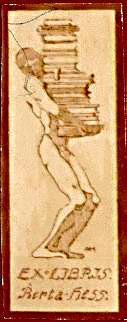 |
|
Ex libris
Berta Hess 1913 |
|
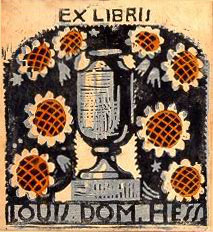 |
|
Ex libris Louis
Dom. Hess
1915 |
|
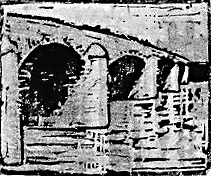 |
|
Bridge over the
Inn – wood engraving 6 x 7 cm
(Innsbruck 1916) |
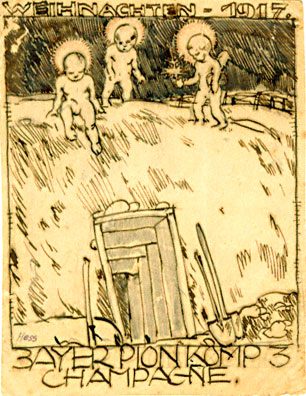 |
|
Angels over the
Trenches water-coloured wood engraving (Champagne –
Christmas 1917) |
|
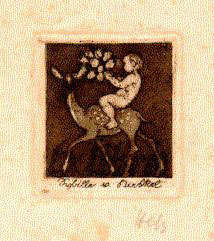 |
|
Ex libris Sebilla von Daskel |
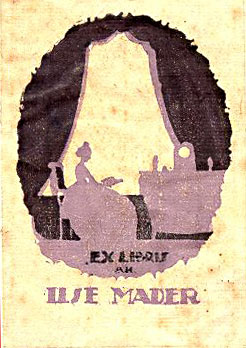 |
|
Ex libris Ilse Mader - 1918 |
(dma) -
Hess was a skilled engraver and numerous examples of
his work show he mastered a variety of techniques (etchings, aquatint,
wood engraving, dry point). The technical complexities of engraving a
wooden or metal matrix which was then used to print reproductions
provided Hess with his first true artistic challenge. In 1913 he was
just 17 and yet extensive practice had already honed his engraving
technique to a high level.
Among his earliest works is a bookplate designed for his sister Berta. It
is in an unusual vertical format and features a stylised male nude
staggering as he seeks to hold a towering pile of bound volumes.
 |
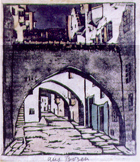 |
|
Bolzano Piazza
Grano
(1915)
etching
10,5 x 11,5 cm |
Via Dr. Streiter
a Bolzano, incisione su linoleum colorato, 1915
(Collezione privata) |
Also from that same early period is a bookplate
for „Louis Dom. Hess“ – one
of the artist‘s first attempts at altering
his given name where Alois becomes Louis and Dominikus is shortened to
Dom. Other early works include the water-coloured wood engraving „Bolzano:
Piazza Grano“ and the black and white wood engraving „Bridge over the
Inn“. In the First World War Hess saw service with the „Bayerischen
Pionier Kompanie“ (Engineer Corps) on the Western Front in Belgium and
Flanders. The conflict did not stop Hess‘ output of engravings. He
produced posters for the army and postcards for his comrades in arms
like „Angels over the trenches“ reproduced here. (For other works from
this period see „Biography – First Steps“).
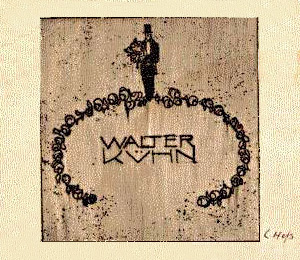 |
|
Ex libris Kühn
Monaco - 1922 |
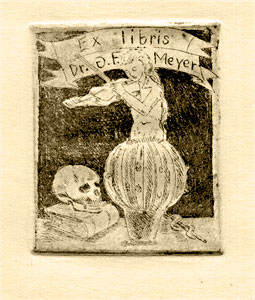 |
|
Ex libris Meyer |
Hess continued his experiments in
graphic art with a series of bookplates. His fascination with the craft
reflected a rich tradition harking back to 1516 to that supreme German
engraver Albrecht Dürer.
With time the design of bookplates had developed far beyond its original
purpose of simply identifying the book‘s owner, seeking instead to
symbolise the reader‘s personality and the character of the volume
itself.
Bookplates have long since fallen into disuse but their artistic value
has been recognised by collectors.
By far the richest collection is to
be found at the British Museum in London which preserves around one
hundred thousand examples.
Christian Hess designed personalised
bookplates to order for numerous clients but few examples have remained.
Here it is possible to reproduce those created for Ilse Mader, the young
Sebilla von Daskel, Dr Meyer, Walter Kuhn and Ferdinand Kende.
Kende must have been a person of importance: Hess made no fewer than
five drafts for his personalised bookplates.
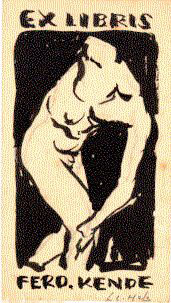 |
5
sketches for bookplates for Ferdinand Kende
|
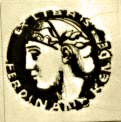
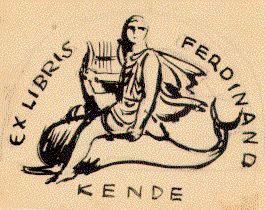 |
|
|
|
|

Frauenkirche
Engraving
cm. 17,5 x 14,5
(Munich 1919) |
Unfortunately
the gradual dispersion of Hess’
works caused by his constant traveling to avoid Nazi persecution has left few examples of
his graphic art. Nevertheless in Germany in 2008 a series of
etchings was discovered in which Hess recalled scenes from
his first visit to Italy in 1925. The etchings, shown here,
are now in the
Municipal Museum in Bolzano.
|
Etchings recalling scenes from Hess’ first
visit to Italy in 1925 (Municipal Museum
Bolzano) |
|
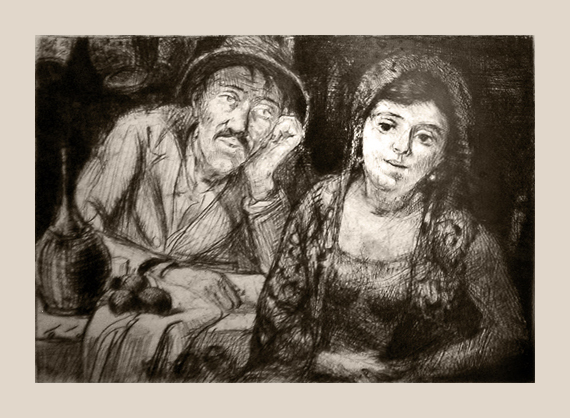 |
|
In the Tavern - etching 13 x 18 cm
on card 26 x 37 cm (Florence 1925)
|
|
|
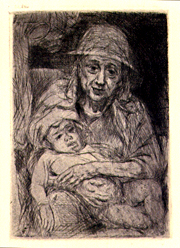 |
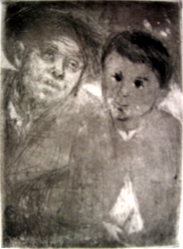 |
|
Mother with child |
Fisherman with child |
|
|
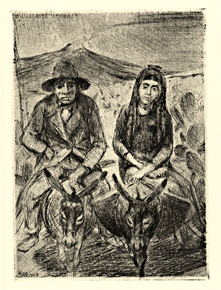
Sicilian couple on donkeys |
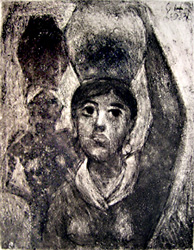
Woman with jug |
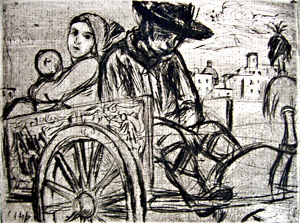
Sicilian family on a cart |
| |
|
|
Among some of Hess‘ finest graphic works are the
dry point portrait of his wife Cecile which was
produced in Lucerne in the final months of 1934
and the beginning of 1935. The background shows
several of Hess‘ works including a large wooden
statue of Christ. Equally excellent are the
painting „Steamer at Lucerne“ and a terracotta
mask. The portrait, which was produced in just a
single copy, and the other works shown here are
all believed lost. The statue of Christ is part
of a private collection in Rome. |
| |
|
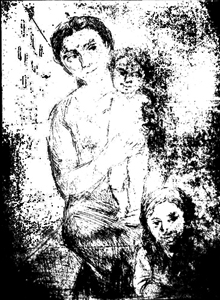
Mother with Children -
engraving
(Messina 1927) Archive photo |
 |
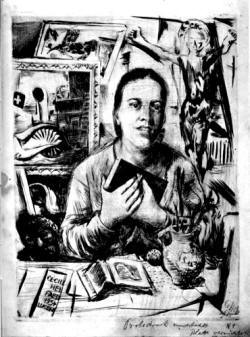
Hess‘ wife Cecile -
dry point 36 x 27 cm
Only one copy produced - plate
destroyed
(Lucerne 1935) |
|
|
|
|
|
|
|
|
>>> |
| |